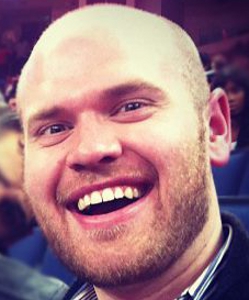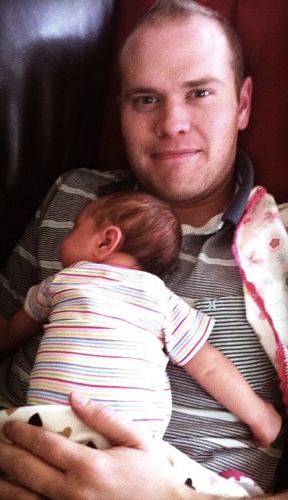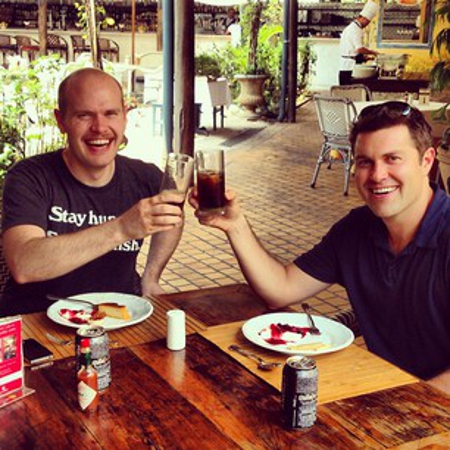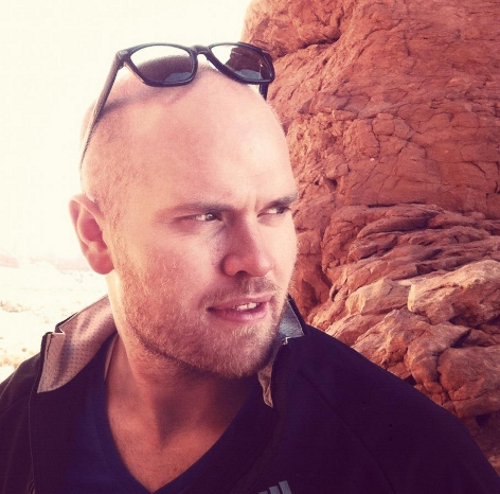- Learn About The Founding Of Brazil’s #1 Baby Ecommerce Site
- How Do You Handle Taxes And Employees In Brazil?
- When Will There Be Some Big Financial Exits In Brazil?
Full Interview Audio

Personal Info
Sports Teams:Utah Jazz, SF 49’ers, BYU football
Favourite Books:
- The Alchemist by Paulo Cuelho
- The Book of Mormon by Joseph Smith
- If Poem by Rudyard Kipling
Most Influenced By:Davis Smith (baby.com.br cofounder), Elon Musk, Tony Hsieh
Twitter: http://twitter.com/mckaythomas
Personal Blog: http://mckaythomas.com/fresh/meet.html
Website: http://Baby.com.br
Interview Highlights
This is a condensed, lightly edited transcript of an audio interview. The full audio is available and highly recommended. The interviewee may post clarifications in the comments.
Adrian Bye: Today I’m here with McKay Thomas, who co-founded Baby.com.br, a baby supplies site in Brazil. McKay, thanks for joining us. You’re originally from Utah, right? 
McKay Thomas: That’s right.
Adrian Bye: How on earth did you end up in São Paulo?
McKay Thomas: We had a pool tables business for seven years. The three founders of baby.com.br were all working at pooltables.com, and we all felt that there was something bigger and better awaiting us after that business. We had an opportunity to sell pooltables.com, which we did. At that time the US had been in a recession for a year and it looked like the recovery was gonna take a couple more years at least. We started looking into the BRIC countries Russia, India, and China, and none of them seemed very livable. Brazil really started calling to us. It’s a great country, very livable, warm climate, great beaches, and it’s relatively safe.
Adrian Bye: You ended up in São Paulo, right?
McKay Thomas: São Paulo is the business hub of Latin America and Brazil.
Adrian Bye: You looked at BRIC countries and thought Brazil might be interesting because of quality of life stuff. Then what happened?
McKay Thomas: We started looking about other economic factors, internet penetration and e-commerce adoption, about what verticals hadn’t been tackled yet as far as e-commerce goes. We’d been selling things online for seven years and it seemed like a natural end of story. It lined up with our abilities and likes. There were several markets that were just completely open, and the baby space was one of them. While we were looking into it, diapers.com here in the US was acquired by amazon for a lot of money. The timing was good. We saw an open opportunity and took it. If you see opportunities, are you not supposed to take them?
Adrian Bye: Absolutely. I got the impression you did some stuff down there and then came back to the US, got funding and then went back and got everything going.
McKay Thomas: We were able to raise a Series A before we actually lived in Brazil. Me and our first hire, In Hsieh, were together every day, interview people, met with service providers. We went office hunting and got the business up and running.
Adrian Bye: How did you get the business going? Where were you getting traffic from?
McKay Thomas: Brazil is famous for its bureaucracy. Even though I was there interviewing and hiring some really talented people, Brazil was making it difficult to get things up and running. It took us seven months to get our business license. We couldn’t even place orders with suppliers. We had legal teams in the US and in Brazil who were just pounding it. That was a hard period. 
Adrian Bye: You are pretty serious about getting the right people on your team.
McKay Thomas: It’s just not worth not getting the best people. It’s the best people that can build the best stuff and change the world, and that was what we wanted to do. The team today stands at about 250 people, most of those hired just within a 12 months period. The first step in getting a good company up and running, at least one that is commerce-heavy, is setting up your executive team. We went about to cherry-pick from the best companies and the most experienced e-commerce companies, people that realized that Brazil had a broken e-commerce system. We wanted people in the system, but not of the system. It took us another several months to find the right person to be over marketing, over finance, over logistics.
Adrian Bye: There’s huge barriers to entering and getting things going in these countries. The fact that you got from raising money in the US to showing up in São Paulo to a company that has 250 people and is the number one baby site in Brazil, and now you are back in the US, that’s astonishing to me. It’s like you did all the hard work and then you left.
McKay Thomas: Life just takes really funny courses. It happened really fast. The other two are still there. I put together the product and the technology team, which is now over 25 strong. The team is really talented, very capable, and I had this other idea. I just felt like the time was right.
Adrian Bye: How did you find working in the culture there? US is organized, on time, can be fairly intense sometimes. Some say Brazil is the opposite.
McKay Thomas: The work culture is definitely different. The culture between Rio, which is just a few hours’ drive from São Paulo, is completely different. Rio is much more relaxed. Everyone goes into work really late, leaves early, takes two-hour lunches, whereas in São Paolo it is a little more westernized. In São Paulo it’s the commerce center of Latin America and Brazil. It is really businessy, and they’re really trying to have a culture that supports that.
Adrian Bye: We look at Brazil as a Third World country, but there’s some incredibly wealthy guys down there.
McKay Thomas: There is a lot of money in Brazil. A lot of the people that we hired on our team came from money and funny enough found it difficult to relate to a lot of our user base or customer base, who were significantly beneath them within the culture there.
Adrian Bye: You’re hiring guys who’re from wealthy families in Brazil but they come to work for you because they wanna get a job. How did they not get the entrepreneurial mindset properly? 
McKay Thomas: Excellent question. That was one of our big hurdles initially. Once you’re a company of about 100 or 150, the start-up question comes up less and less. But when you’re only a team of three, or five, and you are like: “we’re gonna change the country, we’re gonna change the world”, when people start hearing that, they are like “What?” We found ourselves talking like that a lot. We came down there to shake things up. You can’t do that unless you have the right team in place. We have a real focus on hiring women and moms because we wanna be really close to our user and customer base.
Adrian Bye: How do you feel about the prospects of what you guys have been building down there?
McKay Thomas: My prospects are super positive. When I’m looking at what’s happening in Brazil right now I’m looking at something that’s early on but is absolutely going to happen. Baby.com.br is the future Brazil. Start-ups are the future of Brazil.
There are some exits already happening. They’re not as venture-backed and not as public as we would like, but things are starting to rumble down there. Amazon is entering the country in 2013 in a big way. They are already talking acquisitions. Brazil is the future, start-ups are happening. We are just on the brink of that.
Adrian Bye: You intend to expand into other verticals?
McKay Thomas: If you launch on an e-commerce platform you are doing it with sights on the future. We have one vertical today on babies, and really naturally we can expand into other verticals around kids.
Adrian Bye: There is high taxation, making it harder for American companies to get in. The only way you can do stuff properly in Brazil is be there, but then maintain relations back in the States so they can raise more capital as that becomes necessary. Is that the general direction?
McKay Thomas: We were based in Brazil. We don’t have any operations in the United States, but nearly all of our investors are based in the US.
Adrian Bye: What were some of the frustrations down there?
McKay Thomas: The bureaucracy, the taxes. It’s funny hearing people in the US complain about taxes. Everything is taxed at an insane rate in Brazil. For instance, there is over a hundred percent tax on cars.
Adrian Bye: Tax is also an issue anytime you hire an employee. You’re dealing with severance taxes, you can’t fire people. How did you find all of that?
McKay Thomas: We went into this knowing what we’re after hiring people. Although they don’t have a suing culture there employees that have been let go sue the company much more frequently than here in the US. Companies get sued all the time. As far as taxes and employees, it’s hefty. It’s hefty when you hire them and it’s hefty when you fire them.
Adrian Bye: At the same time there is a lot of corruption.
McKay Thomas: There is a ton of corruption. But as Americans, at least up to this point, our consciences are not really allowing us to participate that at all, and I don’t see that ever changing. Corruption is a poison. It’s an absolute cancer. It doesn’t help business, it hurts it. Ultimately, things will change in Brazil. Things aren’t getting less developed, they are getting more developed. A lot of these corruption issues are going to go away, more companies are going to wish that they were doing it this way rather than the corrupt way. So it really is a growth strategy.
Adrian Bye: Do you see some really big exits coming in Brazil? Where do you see the big opportunities?
McKay Thomas: There are lots of business opportunities still available today in Brazil. It’s just like any boom time, there is a good time and a bad time. A few years ago when we were starting baby you really couldn’t have timed that any better. It was perfect. Even though it’s a little bit down the road and things aren’t quite as ripe for the plucking. Brazil just like any great and strong economy has a lot of open opportunity. I think that 2013 and 2014 are gonna be the year of the Brazil exits.
Adrian Bye: That’s when things will take off?
McKay Thomas: I think so. What you have right now are these start-ups that started a couple years ago that are starting to get some real traction. I think 2013, 2014 are the years that all that changes and the world wakes up to the fact that Brazil is a big place. It’s here to stay and it’s here to be a major player.
Adrian Bye: How are you doing payments in Brazil?
McKay Thomas: Payments works very similarly to the US. There is gateways that you can buy into. You can also build your own gateway. Currently we use a third party, but I think as we get big enough that’s something we can do ourselves. Mastercard and Visa have really big footprints there and big initiatives with small and medium sized businesses and with entrepreneurship and start-ups.
Adrian Bye: Do you have enough consumers with the right sort of cards so they can pay easily?
McKay Thomas: Speaking of the payment space particularly there are some unique things to do with Brazil and the Brazilian payments. For instance, you can buy everything with installments there. As an e-commerce player, if you are selling anything more than gum or chips, you’re gonna have to have installments. That’s important for the Brazilian consumer.
Adrian Bye: So you have to deal with all these taxes and all these issues getting started, and then you got that on the other side.
McKay Thomas: You just gotta look at the great opportunity and keep your eyes on that. Getting tripped up in some of these smaller details isn’t conducive to building a bigger business. You have to keep your eyes on the larger prize, on the farther goal. Short-term doesn’t matter. We’re building a billion dollar company here. We have to keep our eyes on that.
Adrian Bye: How do you do things like delivery? Brazil is a big country.
McKay Thomas: We do have free shipping to nearly everybody who’s shopping online right now. That’s in the south and southeast of the country where the bulk of the e-commerce activity is happening for us. However, anyone in the country can buy anything on our website and we’ll ship it to you. But we don’t really offer free shipping. We share that cost with the customer.
Adrian Bye: You must be using some sort of internal shipping service, are you?
McKay Thomas: We partner with shipping carriers and obviously to get to Manaus it is going through the air.
Adrian Bye: People up here in the US don’t realize just quite how big Brazil is.
McKay Thomas: There’s 200 million people, so it’s big population wise, and then as far as square mileage it’s one of the biggest countries in the world. That’s a drain when you’re thinking about logistics and starting a business.
Adrian Bye: Is there anything you wanna talk about which we haven’t covered?
McKay Thomas: Actually I’ve mentioned my new venture. It is in the mobile smartphone space. In many ways I’m just picking up where I left off with baby.com.br. We have a facebook community at baby.com.br that have over a million moms. That was one of my first projects, trying to figure out what can we do to grow this. How can we get more people engaged? What are moms interested in talking about? So we would post things and then watch what would happen and the comments. That’s what makes facebook really cool. If you can get something sticky you can get a wealth of data back about your users. At baby.com.br we’re meeting a lot of moms’ physical needs, diapers, wipes, strollers, getting it more convenient, maybe a little cheaper. But moms also have emotional, maybe even spiritual needs. What I am looking to do is build an app that tries to solve some of those problems. I’m really excited about my next project.
Adrian Bye: You think this one will build on top of baby.com.br, but will be more global rather than just Brazil?
McKay Thomas: It’s not directly affiliated with baby.com.br. It’s servicing moms. Although I’m starting in the US, that is something that can have global reach. I’m calling it New Co. There should be more to read about, more to hear about this in the coming months.









